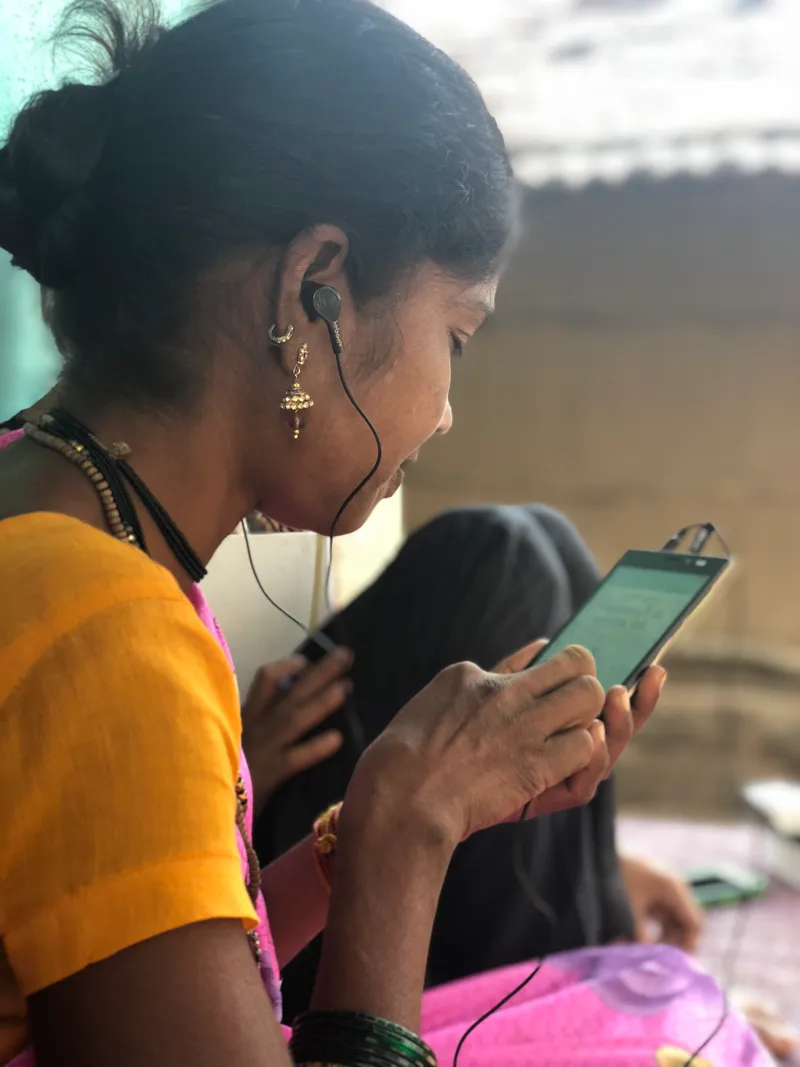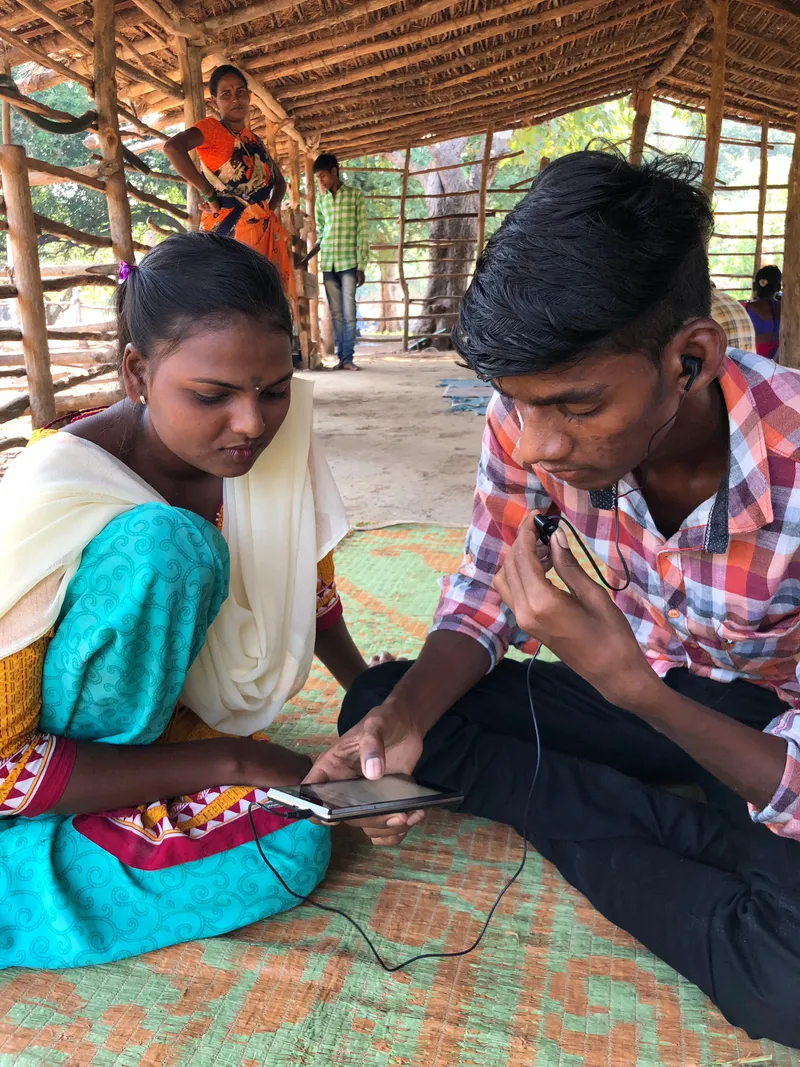How non-profit Karya is bringing digital, dignified work to rural India
Karya, born out of a Microsoft Research project, provides AI-enabled digital work to people from marginalised communities across 22 states. It aims to equip low-income rural Indians with inclusive smartphone-based solutions to earn, learn, and grow.
In Tilonia, a remote village in Rajasthan, Ramola didi, a former construction worker, teaches a computer how to speak Marwari. Earning $5 an hour, Ramola may be unaware she’s part of a movement that includes over 30,000 others like her engaged in dignified work and ethical data usage that has positive financial and technological implications.
Initiated by a non-profit organisation, the project empowers communities in 22 states in India.
But, for Ramola, it’s just a few hours of work.
“I really like this kind of work because there’s no physical pain or hard work involved. I can now work from my home. It is also really nice that we are teaching computers how to speak Marwari. Marwari is a great language, plus it’s our language. If everyone is hearing my voice and it is helping spread my language, what can be a bigger motivation than this?” she says.
Since its launch in late 2021, over 30,000 people from rural India have completed more than three million tasks with Karya and earned $800,000 in wages. Its solution is both simple and forward-thinking—equip low-come communities in rural India with smartphone-based solutions to learn and grow. All in languages they call their own.
Tech for good

Vivek Seshadri, Safiya Husain and Manu Chopra
Vivek Seshadri and Manu Chopra started in 2016 as a research project at Microsoft Research. While completing his PhD in Computer Science at Carnegie Mellon University, Seshadri realised he belongs to the top 1-5% of global citizens in terms of opportunities and economic or financial well-being.
“Not many people were directly working on addressing problems of the bottom half of the economic pyramid. I was looking for opportunities where I could potentially work on those problems, with guidance and mentorship, and that's when I found that Microsoft Research in India has a group called ‘Technology and Empowerment’, which was precisely doing that,” he says.
Seshadri joined the team of researchers and technologists at Microsoft Research to determine how technology can tackle problems faced by marginalised communities and low-income populations. Chopra, who studied computer science and anthropology at Stanford and returned to India to build tech for good, joined him in 2016 and they started working together on Karya as a research project.
“I had grown up in Shakur Basti in Delhi, and had some experience of seeing poverty firsthand. I always felt my goal in life was to sustainably tackle poverty,” Chopra says.
Dignified work for rural India

A woman from rural India working on the Karya app
The founders realised that many people in rural communities were predominantly stuck with physical labour, which is seasonal. With smartphone use growing and data becoming cheaper, they came up with the idea to bring high-paying digital tasks to workers in rural India. Language was one sphere of interest.
“There is going to be work available in all languages and technology being built for them. Our question was, how can we protect that work?” says Seshadri.
Their first research paper published in 2019 explored whether people in rural communities could do text transcription. They found that even first-time smartphone users were able to do the task extremely well.
After four years of research, the duo spun out Karya from Microsoft Research to become a non-profit in 2021.
Karya’s initial pilots were in Aamle, Maharashtra and Soda, Rajasthan. The response on ground was exciting, the tasks were quick to learn, and it paid much more than physical work. Also, it is dignified work in an environment of low wages.
“I remember a young girl in Maharashtra telling us that she felt like Shivaji while doing this work because the was building a language model in Marathi. It also became community-oriented; people would sit together and do their tasks and helping each other,” says Chopra.
Karya’s first user, Reshma, who lives in a remote and tribal area in the mountains of Maharashtra, had never seen or used a smartphone before. But, within 30 minutes of using its application, she learned how to type Marathi on her new phone. A part of multiple Karya projects, she invested the amount she earned in her education and is studying to be a fashion designer.
While Karya’s projects have had a socio-economic impact in 22 states, Seshadri desists from calling it “life-changing” as it is not a substitute for primary work.
“No one had to leave their farming activities or other physical work to be part of Karya. They could spend even one to two hours a day on Karya’s tasks,” he clarifies.
Building a versatile platform

Dignified digital work for rural Indians
Karya offers four different tasks—speech/text collection, validation, image/video data collection, and annotation.
“It is simple as reading out a sentence in your language, which is basically training data for AI models. Then there is image annotation—annotating a certain to help the computer understand what it looks like. The same thing happens in video and text. All these digital tasks together make up a $100 billion training industry,” Chopra explains.
Over 95% of the workers on Karya’s platform come from marginalised communities, and 60% of its workers are women, who are typically underrepresented in AI datasets. The platform can be deployed even in low-resource areas with no internet and its Android app is supported on smartphones going all the way back to Android 6.
Karya has partnered with over 200 NGOs to identify the workers, who are trained remotely on the smartphone itself.
After working with the UN and many think thanks, Safiya Husain joined the team in 2022. As Chief Impact Officer, she leads research at Karya and is developing its ‘Learn’ and ‘Grow’ interventions to determine focus areas to find jobs or sustain social mobility.
“Karya Learn aims to be a versatile and inclusive smartphone-based skilling platform that amplifies existent skilling content and initiatives across India. Karya Grow will be a career guidance and support platform,” Hussain says.
The initiative wants to go a step further by giving its workers principal ownership.
“It’s unacceptable to have datasets worth $50, $100, $300, or $1000 while wages per hour are not increasing at the same rate as the value of data sets. Karya created the Karya Public Licence that ensures that all our datasets are kind of sold under the KPL which makes it non-exclusive,” she elaborates.
This means a singular data set has the potential to give the workers who've created it to gain a recurring income if it's sold multiple times.
Seshadri and Chopra started Karya from a seed grant provided by Microsoft. Last year, they received a project-based grant from the Gates Foundation to bring dignified work to 30,000 additional women in six language communities—Bhojpuri, Hindi, Telugu, Bengali, Marathi, and Malayalam. It’s also part of the The/Nudge accelerator this year, Fast Forward in the US, 100X, a London-based impact accelerator, Echoing Green, and the Acumen Fellowship.
“Apart from these, we have numerous projects that fund our work. We work with the government through IIT that is our nodal agency. Our goal is to secure more projects and work more aggressively on our sales and marketing initiatives,” says Chopra.
(The story has been updated to correct the name of Ramola's village from Soda to Tilonia in Rajasthan and also reflect Karya's latest numbers regarding disbursement of wages, that is $800,000)
Edited by Kanishk Singh






